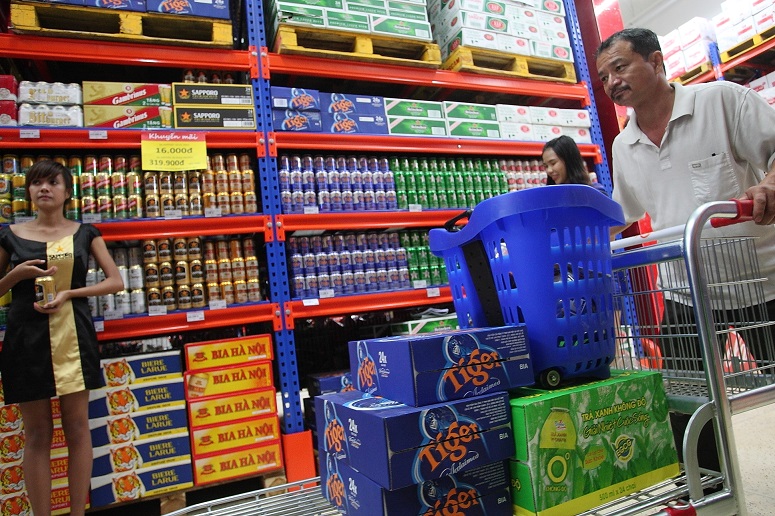Industry experts say that potential investors have the right to negotiate for the best price, but the process of buying Vietnam’s two leading breweries must follow market regulations.

The Ministry of Industry and Trade (MoIT) is pushing its divestment efforts at two leading breweries Habeco and Sabeco in October and November. The Ministry plans to give up its entire 81-per-cent ownership at Habeco, as well as withdrawing 53.59 per cent of its 90-per-cent stake at Sabeco. The deadline for both sales is December.
Carlsberg, which is currently Habeco’s major shareholder with 17 per cent, has expressed interest in rising its ownership to 51 per cent.
Vuong Toan, deputy CEO of Habeco, said that the firm will submit its negotiation plans with Carlsberg to the prime minister before November 15.
As the deadline is drawing nearer, Carlsberg and Habeco has yet to reach an agreement after nine rounds of negotiation. One problem is that besides beer production, Habeco also operates in agriculture and real estate, areas where foreign ownership is limited at 49 per cent of the outstanding shares.
However, the bigger issue lies in pricing. Habeco’s shares are trading on the Ho Chi Minh Stock Exchange at VND124,000 ($5.28). This is twice the quote on Habeco’s first trading day and 1.5 times higher than the initial public sales price, which took place nine years ago. Despite this surge, Carlsberg offered to buy in Habeco at VND48,000 ($2.11).
The reasoning behind the offer, according to Carlsberg, is that Habeco’s business has slowed down by 11.6 per cent since 2014. Due to this decline, Habeco has also lost its second position in the Vietnamese beer market.
Despite the arguments, it is apparent that Carlsberg is still eager to dominate Habeco and take over the Vietnamese beer sector. Specifically, if the Danish brewery manages to seize control, it will boast a 30-per-cent market share in Vietnam and put hands on well-known local beer brands like Hanoi Beer, Huda, and Tuborg.
Analysts at Ho Chi Minh Securities said that the price has not been finalised and it can be lower than market expectations.
Reports from FPT Securities and VCB Securities also pointed out that Carlsberg’s offer does not follow market prices and an undervalued sale will negatively affect the state budget. Previously, Carlsberg was accused of buying under the market price when it acquired 50 per cent of Huda Beer.
Pricing must follow market regulations
In reality, despite experiencing slowing business, Habeco remains the champion of the northern Vietnamese market. In 2017, the brewery aims to produce 542 million litres of beer, up 3 per cent year-on-year.
Revenue is expected to reach VND8.8 trillion ($387,200), a 9 per cent increase. The dividend ratio is likely to stand at 20 per cent.
Viet Capital Securities’ reports pointed out that the growth potential of Habeco and Sabeco is still immense, thanks to Vietnam’s ever-growing beer market.
In 2016, Vietnam consumed 3.8 billion litres of beer, stumbling behind Japan and Korea in terms of per capita consumption. On average, each Vietnamese person drinks 41 litres of beer a year, and beer takes up the vast majority of alcoholic beverage consumption in Vietnam.
After listing, Habeco is now one of the largest companies in the Vietnamese stock market, capitalised at VND24 trillion ($1.05 billion).
Sabeco is also doing well, as its market capitalisation only stands behind dairy giant Vinamilk. Lots of foreign investors are lining up to buy stocks at these firms, including Asahi, Thai Beverage, Singha, Kirin, and Heineken.
Favourable market conditions have allowed the government to list and divest Habeco and Sabeco. However, from drama with Calsberg, experts warned that the government should be extra careful in asset valuation and pricing.
State-owned assets like the two beer firms should not be sold under value, and market price on the stock exchange must be taken into account when developing a divestment plan.
Moreover, experts asserted that the sale must be widely promoted to attract attention from both Vietnamese and overseas investors.
VIR